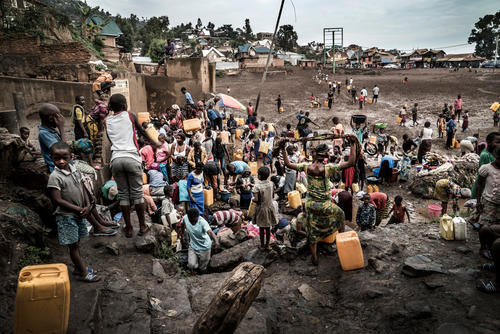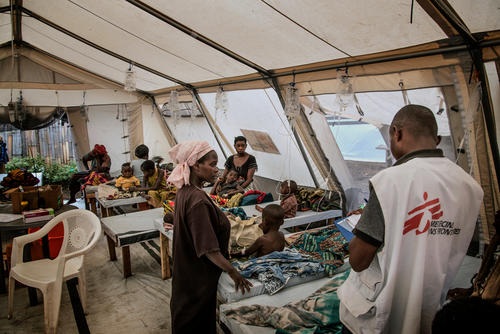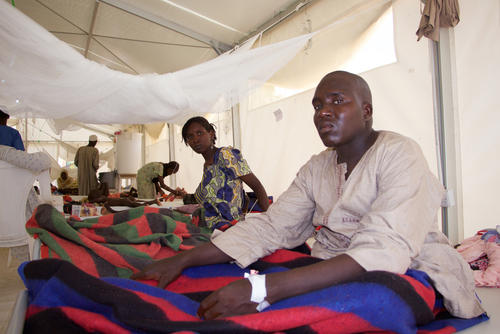MSF has treated more than 18,000 cholera patients across Democratic Republic of Congo this year.
Aline Kaendo knew how to keep her five-year-old son Aristide safe from cholera at home.
“We treat the water at home, but the children play in the lake, perhaps drink from it while they play, share food, and if they have bought it in the street, it may not have been prepared hygienically,” she says.
“They pick up fruit and eat it straight away – there are many ways in which my son could have become ill.”
Aline, 22, received all the right information to prevent her son from contracting cholera: wash your hands, keep toilets clean, treat the drinking water, clean fruit and vegetables. But Aristide still fell ill.
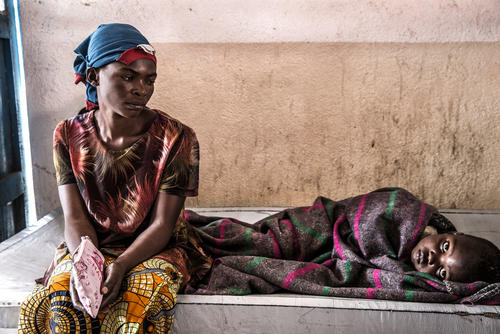
Aline took him directly to the cholera treatment centre (CTC) that Médecins Sans Frontières (MSF) has established in the city of Minova, South Kivu, in the east of Democratic Republic of Congo (DRC). At the CTC, MSF provides cholera treatment free of charge.
Cholera is widespread across DRC and, with more than 18,000 cases treated by MSF this year, (38,000 cases registered in the country), it is estimated that it will still take many weeks to bring it under control.
An unprecedented number of provinces affected
While in some areas the number of cholera patients is decreasing or remaining stable, new cases are appearing in towns where it has never been recorded before. The persistence of cholera in 21 of the country's 26 provinces is unprecedented in the history of the disease in DRC.
Aline took Aristide directly to the Minova CTC because many of her neighbours had to take the same route and be there for a minimum of four days to be treated properly. By 11 October, 21 patients were being treated at this CTC. A few weeks ago, a peak of between 50 and 55 new patients were admitted every day. Aline lives in Budondo, close to Lake Kivu, a lake that dominates the region of South Kivu and also carries the potentially deadly disease.
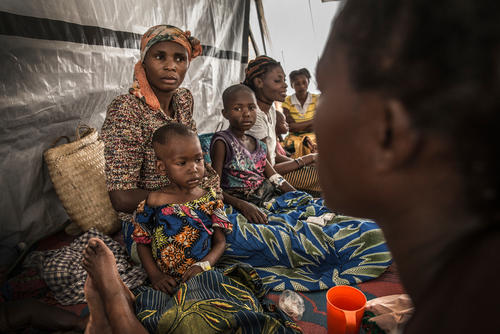
Why the current cholera outbreak is so virulent
“One of the main reasons why cholera has increased in such a way this year is the drought that has affected the country,” explains Francisco Otero, MSF's head of mission in DRC.
“Wells have dried up or lowered in level and many people have been forced to collect water from unsafe sources, such as lake or rivers, because the authorities are not able to provide safe drinking water to the population. The response to cholera can’t only be medical treatment, it is also necessary to work on development to provide adequate water and sanitation to the population. Until that happens, cholera will remain a real threat.”
Another cause of the rapid spread of the disease is its infiltration of densely populated cities. The capital of North Kivu, Goma, also served by Lake Kivu, has been affected, as have Minova and Bukavu, the capital of South Kivu, where cases have been found in many neighbourhoods. In all of these cities, MSF is working to treat patients with cholera.
In many cases, cholera devastatingly affects children under the age of five but recently, cases of older children with cholera have been detected in centres managed by MSF.
“We believe that the start of school has also contributed to the spread of cholera,” explains Innocent Kunywana, MSF emergency department coordinator in the province, in charge of our response to the epidemic.
“More children over six are becoming infected now than they were a month ago. This may be due to the fact that students are exposed to contaminated food or drink on the way to school.”
This was confirmed by Jacqueline Niganda. Her son Awezaye, aged 10, became ill with very violent diarrhoea. They collect water from a “poorly built” source she explains, adding that Awezaye has to walk for more than an hour to go to school. “And there, I can’t control what he does, eats or drinks,” she says.
Another reason why cholera continues to spread across DRC is the erratic prevention and information response to the population. Cholera is endemic in several DRC provinces and sporadic cases are a regular occurrence. In spite of this, health workers often don’t know how to treat it.
“We have found some hospitals where cholera patients were mixed with other patients,” says Kunywana.
“Or the beds had no fluid drainage holes (those affected can lose up to ten litres of fluid through vomiting and diarrhoea), so the risk of infection to their companions or other patients was very high.”
Kahindo Chiraba travelled to Minova with her sick son. In Nyamasasa, her village, the water sources are damaged, so she collects water from a river that is “not in a very good state” and has no chlorination points (where people collecting water receive tablets to treat it).
Compounding this is the fact that the villagers have not been informed about the dangers of untreated water. Kahindo says that months ago, in August, some strangers promised they would come to explain how to prevent the spread of the disease, but they never returned. Many people in her village have become ill.
“According to the Ministry of Health regulations, the treatment of cholera should be free, but sometimes hospitals are not provisioned for this. They must buy the materials and medicines themselves and operate with a cost recovery system. To ensure they don’t end up losing money, they often charge the patient all the same,” adds Otero.
Ressancement Kisakalaba, a patient finishing his course of treatment at the MSF CTC on the island of Idjwi, explains: “Before MSF arrived, they didn’t let you leave if you didn’t have the money to pay. A friend had to act as a guarantor or the head of the village had to be held liable and say you would pay the bill and only then would the hospital agree to discharge you.”
Ressancement, a 42-year-old farmer with nine children, lives on an islet called Ntaligeza, situated across from Idjwi, which is accessed by canoe. After he went to the toilet with diarrhoea four times in 10 minutes, he decided to cross over to Idjwi and travel to the CTC.
Idjwi is the most recent centre opened by MSF in South Kivu. About four tonnes of material were sent by boat in order to erect tents, isolate patients, install beds and develop a treatment system according to the severity of the patients. It will still take weeks to control the epidemic around Idjwi.
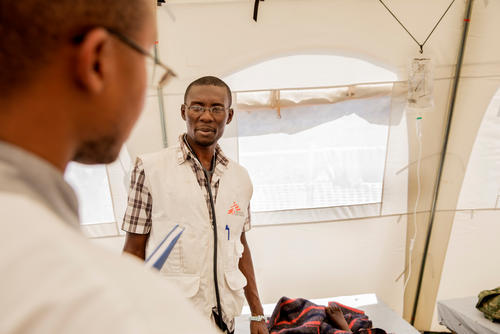
More help needed to tackle the epidemic
Although North and South Kivu border Rwanda, and are thousands of kilometres away from the DRC's capital, Kinshasa, they remain affected by a two-decade conflict and the multiplicity of armed groups dominating much of the region.
“We see how there are increasingly fewer non-government organisations, a smaller presence of agencies and humanitarian aid organisations capable of dealing with emergencies of this type with sufficient and adequate means, especially in South Kivu,” says Otero.
He observes that, despite the enormous need, the violence, and the regular displacement of much of the population because of the conflict, South Kivu is being gradually abandoned.
“This year we saw the epidemic of measles, we see it every day when helping displaced people and it has been shown again in this cholera epidemic. These situations are going to be repeated and will get worse if this situation is not reversed,” he says.
“The United Nations has raised the emergency level for the province to the maximum, level three. We’ll have to see how this translates in the territory.”



